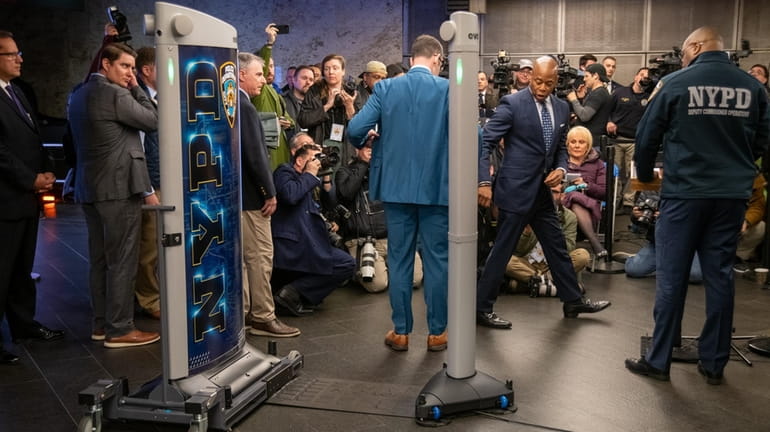New York City subways to get body scanners at entrances to check for weapons

After an NYPD detective walked through a body scanner, Mayor Eric Adams explained Thursday how the device would detect weapons at subway entrances. Credit: Ed Quinn
Body scanners are to be tested at some New York City subway entrances, Mayor Eric Adams announced on Thursday amid a recent spike in high-profile violent crimes in the system.
Among the scanners being considered are those that pinpoint, on a nearby screen, where a weapon is suspected to be on a passenger's body, clothes or bag. A police officer can then scrutinize the passenger.
“Trust me, it is clearly impressive when you’re able to see how this technology is able to zero in where a gun potentially could be carried,” Adams said, speaking at a news conference inside Manhattan's Fulton Street station and gesturing at a scanner by the company Evolv Technology. The scanners are already used at museums, stadiums, theaters and other venues.
An NYPD document posted after the news conference says that only police supervisors at the rank of captain or above can pick the checkpoint locations and frequency of those subject to inspection, such as every fifth passenger.
Scanning could be deployed in as soon as 90 days, Adams said.
A city law was passed in 2020 requiring disclosure of at least 90 days notice before the deployment of surveillance technology.
“We are going to use technology to identify those bad people who are carrying bad weapons,” Adams said. He added that a pilot program would start with a few scanners and could be expanded based on the results.
Adams said the program would not use biometrics or facial recognition.
A scan would take up to three seconds per passenger, Adams spokesman Fabien Levy said.
At the news conference, NYPD personnel demonstrated the Evolv scanner, which is one of the companies whose machines are being considered for the subways, Adams said.
Evolv's system uses ultra-low-frequency, electromagnetic fields to detect concealed weapons, according to the company website. Artificial-intelligence technology is programmed to distinguish between weapons and benign objects. An image of the passenger, with the suspicious area highlighted, is then displayed on a screen.
A passenger could decline to go through the scanner and leave the subway station, said the NYPD's top lawyer, Michael Gerber. But once the passenger submits to the scan, if there is a hit, the passenger must submit to a second police search — but it can only be of the area identified by the machine. Any contraband discovered in the area — even if not a weapon — can lead to arrest.
“If you’ve chosen to come into the system — you know the machine’s there, you choose to go through the machine, once you’ve done that, if there’s an alert, there’s gonna be a search in that area,” he said.
Jerome Greco, supervising attorney of the Digital Forensics Unit at the Legal Aid Society, said in a statement: “This Administration’s headstrong reliance on technology as a panacea to further public safety is misguided, costly, and creates significant invasions of privacy. During this interim period, we urge all New Yorkers to voice their concerns with the City over these dystopian technologies.”
Earlier this month, Gov. Kathy Hochul ordered 1,000 state troopers, National Guard personnel and MTA cops into the subway system to help conduct random bag checks in the system.
In October, the U.S. government announced that its investigators are probing Evolv over allegations that its detectors don’t work as claimed.
Asked Thursday about the federal investigation, Adams said, "People may have had bad experiences with this technology, but we witness that it's living up to our expectations." He said the city would nevertheless analyze whether it's indeed living up to expectations.
Evolv spokeswoman Alexandra Smith Ozerkis said later by email: "We are happy to cooperate with all regulators who inquire about our products and stand behind our technology." She wouldn't answer how much the device costs.
Adams also announced Thursday that the city is ready to hire more clinicians who would be able to involuntarily order hospitalization of passengers with untreated, severe mental illness. The clinicians travel with police officers in search of such passengers.
“We’re gonna respect civil liberties, but you don't respect individuals when you ignore that they're crying out for help,” he said, days after yet another passenger was pushed into the path of an oncoming train and killed, this one in East Harlem on Monday.
Erratic behavior is a top rider complaint, said Metropolitan Transportation Authority head Janno Lieber.
“We have compassion, but our riders should not be subject to that sense of discomfort and fear and disorder that is part of the result of this problem we're trying to fight against,” he said.
Body scanners are to be tested at some New York City subway entrances, Mayor Eric Adams announced on Thursday amid a recent spike in high-profile violent crimes in the system.
Among the scanners being considered are those that pinpoint, on a nearby screen, where a weapon is suspected to be on a passenger's body, clothes or bag. A police officer can then scrutinize the passenger.
“Trust me, it is clearly impressive when you’re able to see how this technology is able to zero in where a gun potentially could be carried,” Adams said, speaking at a news conference inside Manhattan's Fulton Street station and gesturing at a scanner by the company Evolv Technology. The scanners are already used at museums, stadiums, theaters and other venues.
An NYPD document posted after the news conference says that only police supervisors at the rank of captain or above can pick the checkpoint locations and frequency of those subject to inspection, such as every fifth passenger.
Scanning could be deployed in as soon as 90 days, Adams said.
A city law was passed in 2020 requiring disclosure of at least 90 days notice before the deployment of surveillance technology.
“We are going to use technology to identify those bad people who are carrying bad weapons,” Adams said. He added that a pilot program would start with a few scanners and could be expanded based on the results.
Adams said the program would not use biometrics or facial recognition.
A scan would take up to three seconds per passenger, Adams spokesman Fabien Levy said.
At the news conference, NYPD personnel demonstrated the Evolv scanner, which is one of the companies whose machines are being considered for the subways, Adams said.
Evolv's system uses ultra-low-frequency, electromagnetic fields to detect concealed weapons, according to the company website. Artificial-intelligence technology is programmed to distinguish between weapons and benign objects. An image of the passenger, with the suspicious area highlighted, is then displayed on a screen.
A passenger could decline to go through the scanner and leave the subway station, said the NYPD's top lawyer, Michael Gerber. But once the passenger submits to the scan, if there is a hit, the passenger must submit to a second police search — but it can only be of the area identified by the machine. Any contraband discovered in the area — even if not a weapon — can lead to arrest.
“If you’ve chosen to come into the system — you know the machine’s there, you choose to go through the machine, once you’ve done that, if there’s an alert, there’s gonna be a search in that area,” he said.
Jerome Greco, supervising attorney of the Digital Forensics Unit at the Legal Aid Society, said in a statement: “This Administration’s headstrong reliance on technology as a panacea to further public safety is misguided, costly, and creates significant invasions of privacy. During this interim period, we urge all New Yorkers to voice their concerns with the City over these dystopian technologies.”
Earlier this month, Gov. Kathy Hochul ordered 1,000 state troopers, National Guard personnel and MTA cops into the subway system to help conduct random bag checks in the system.
In October, the U.S. government announced that its investigators are probing Evolv over allegations that its detectors don’t work as claimed.
Asked Thursday about the federal investigation, Adams said, "People may have had bad experiences with this technology, but we witness that it's living up to our expectations." He said the city would nevertheless analyze whether it's indeed living up to expectations.
Evolv spokeswoman Alexandra Smith Ozerkis said later by email: "We are happy to cooperate with all regulators who inquire about our products and stand behind our technology." She wouldn't answer how much the device costs.
Adams also announced Thursday that the city is ready to hire more clinicians who would be able to involuntarily order hospitalization of passengers with untreated, severe mental illness. The clinicians travel with police officers in search of such passengers.
“We’re gonna respect civil liberties, but you don't respect individuals when you ignore that they're crying out for help,” he said, days after yet another passenger was pushed into the path of an oncoming train and killed, this one in East Harlem on Monday.
Erratic behavior is a top rider complaint, said Metropolitan Transportation Authority head Janno Lieber.
“We have compassion, but our riders should not be subject to that sense of discomfort and fear and disorder that is part of the result of this problem we're trying to fight against,” he said.

